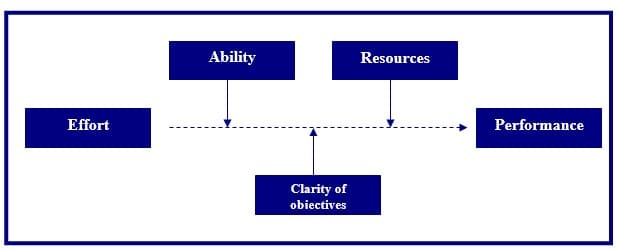
Linking Effort and Performance
There is little motivation for employees to work if the link between effort and performance is weak. This article shows the factors linking effort and performance.

Firstly, staff must be capable of the required performance. This will depend upon the initial selection procedure and the provision of adequate training opportunities. Secondly, it is essential to set clear, quantifiable objectives. It is important to note that there is a gap between what the manager sees as clear and what the member of staff sees as clear. The subordinate’s perspective and knowledge may differ from the manager’s. The individual briefings held by management could provide an opportunity to make clear to staff just what it is that they require, or to check that the member of staff has understood and feels able to meet the requirements. Joint objective setting is one way in which the clarity of objectives can be improved.
Finally, if the necessary resources for doing the job are lacking, then people will feel that their level of performance does not depend solely on their efforts. Motivation suffers when performance is limited by factors outside a person’s control, such as inadequate time allowance. This may be one factor within the control the management team to control when allocating work. It is often useful to allocate work as far in advance as possible. If deadlines are clearly specified, the person can then allocate time between the various tasks in the most efficient way.
Types of Outcomes Available
Outcomes can be classified, be they rewards or punishments, as extrinsic or intrinsic. Extrinsic outcomes involve some intermediary whereas intrinsic outcomes are those that result directly from the performance of the work. Praise is an example of an extrinsic outcome and so, of course, is pay. Both are ‘given’ by somebody else; it is generated by the performance itself. Other intrinsic outcomes might be a feeling of having learned something, or a feeling of having performed a worthwhile job. Sometimes praise or other comments may be necessary for these feelings to occur, but often the job may be such that no such intervention is necessary: for instance, if the job has been well designed, with clear objectives, the knowledge of results may provide such feedback as is needed.
Because different outcomes are important for different people, it is impossible to say to what extent the staff value intrinsic outcomes. The individual briefings will gain some idea; but it is worth bearing in mind that if a person has never experienced intrinsic outcomes at work, he or she is unlikely to mention them as important. This does not mean that if some way could be found of introducing intrinsic outcomes, these would be ineffective. When people find they can, after all, gain satisfaction of their growth needs at work; they may value this highly.
The table shown below is not meant to be in any way exhaustive, but it does provide some key outcomes for linking effort and performance.
| Intrinsic Outcomes | Extrinsic outcomes |
| Self-respect | Pay |
| Sense of achievement | Status within company |
| Feeling of having learned something | Fringe benfits |
| Feeling of having done something worthwhile | Pleasant working environment |
| Feeling of having contributed something necessary | Variety |
| Fatigue | Praise |
| Promotion | |
| Move to different work | |
| Free time | |
| Social punishments | |
Receive a Tailored Service from The Eventus Recruitment Group
If you are looking for a new job or recruiting in the legal, HR or finance profession, please contact us today and arrange a consultation. We provide a tailored, personalised service. Contact Siobhan Courtney on 07970 252772.
Follow us on social media via Linkedin, Twitter, Facebook and Instagram.

